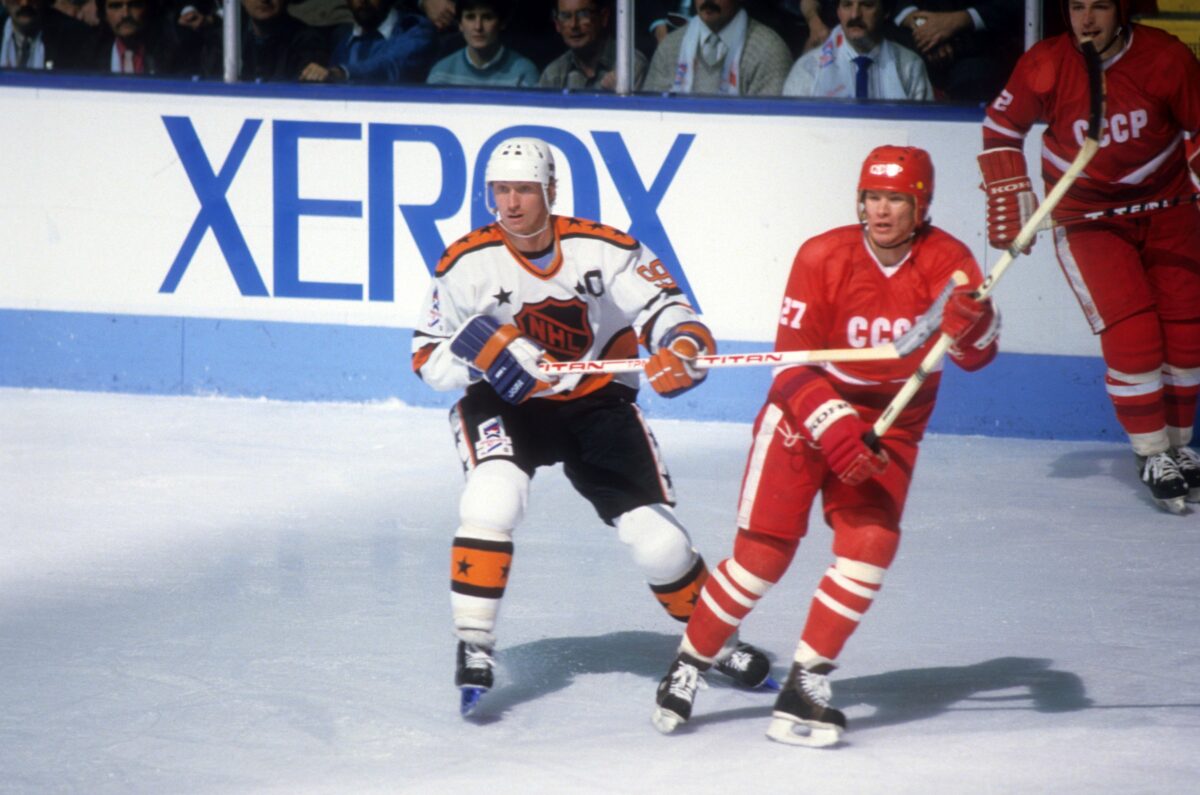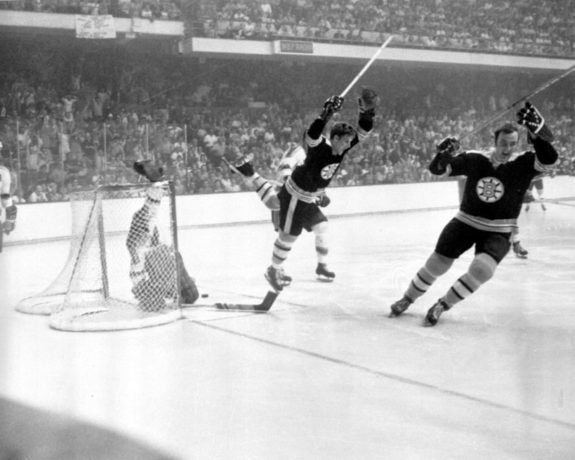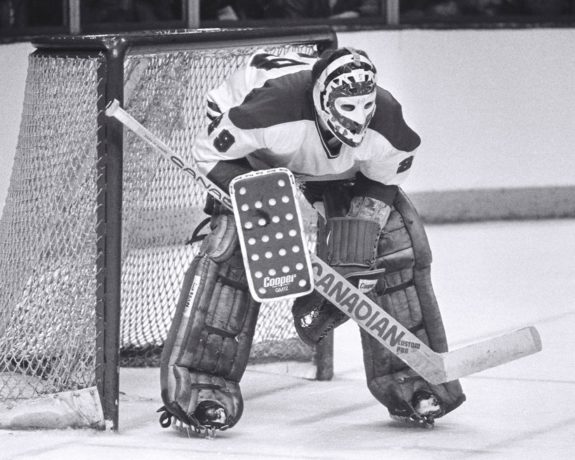Ontario has developed some of the greatest players to have ever stepped foot onto the ice of an NHL arena. Not only has there been an ability to develop great talent, but there has also been an impressive number of NHL and professional players developed in the province. The selected players and those who just missed the cut have won many Stanley Cup championships, been named to All-Star teams, been nominated to the Hockey Hall of Fame (HHOF), and are on the 100 Greatest NHL Players list. This article will assemble a starting lineup for an all-Ontario team.
Left Wing – Frank Mahovlich
A left winger with size and a great shot, Frank Mahovlich, a Timmins native, began his career in Toronto at St. Mike’s before being called up to the Toronto Maple Leafs in the 1957-58 season. Scoring 20 goals in his rookie season, “The Big M,” as he was known, beat out Bobby Hull for the Calder Trophy as the top rookie that season. By the 1960-61 season, Mahovlich cemented himself as a star player, scoring 48 goals for the Maple Leafs — his career high was 49 with the Detroit Red Wings in 1968-69. He spent the majority of his 12 seasons with the Leafs and won four Cups in their colors.
Related: Montreal Canadiens’ Top 20 Goal Scorers All-Time
He had four productive seasons with the Red Wings, but his best seasons were the four he played in a Montreal Canadiens sweater where he had his two most productive seasons (96 and 93 points), had his pest point-per-game numbers and also won two Cups. During his time in Montreal with his brother, Pete, both were selected to play for Canada in the historic 1972 Summit Series. Frank then left the NHL in 1974 to earn more money playing in the upstart World Hockey Association (WHA). Mahovlich spent four years with the Toronto/Birmingham franchise, but by that time he was in the twilight of his career and retired from hockey in 1978. He finished his career with six Cups, 533 NHL goals, and 1,103 NHL points in 1,181 NHL games.
Center – Wayne Gretzky
Selecting Wayne Gretzky to center this lineup was the easiest choice on this list. A 10-time Art Ross Trophy winner as NHL points leader, holder of the record for most goals in a season (92) and a career (894), most points in a season (215), and a career (2,857), the only player to score 50 goals in 39 games (from the start of the season), and four Stanley Cups, Gretzky’s resume is littered with greatness. His impact on the NHL and the game of hockey was so great that his No. 99 was retired by not just the teams he played for but the entire NHL.

One half of the highest-scoring brother combo in NHL history with his brother Brent Gretzky, they combine for 895 NHL goals. 894 for Wayne, and 1 for Brent. All kidding aside, making the NHL is no easy task, even just for one game, and it is an accomplishment to score a goal in that league. That makes Wayne’s exploits that much more impressive. On top of his Cup championships, he adds multiple Canada Cup championships. However, it was his time with the Edmonton Oilers that allowed him to become “the Great One” as the catalyst for the 1980s Oilers Dynasty.
What cements his legacy as the greatest ever will be “the trade,” an event that allowed the Los Angeles Kings to make hockey more than just a mainstream sport in California, but one that drew the attention of the USA, reaching its zenith with the Pro Stars cartoon starring Gretzky, Micheal Jordan, and Bo Jackson, introducing the sport of hockey to millions of children and kicking off a new wave of NHL expansion starting in 1991, growing the NHL from a 21-team league to 32 teams by the 2021-22 season.
Right Wing – Brett Hull
Fans of the Calgary Flames are still upset that their team’s 1984 sixth-round pick was traded away in his rookie season when he was nearly a point-per-game player. But Brett Hull’s trade to the St. Louis Blues allowed him to become one of the most prolific snipers in NHL history, especially once the Blues brought in Adam Oates to set Hull up to focus on shooting. Hull had 72-, 86-, and 70-goal seasons following that pairing. In his time with the Blues, he was able to win the Hart Trophy, a Lady Byng Award as the most gentlemanly player in the NHL, and scored 527 goals and 936 points in 744 games, yet was unable to win a Stanley Cup.
Hull joined the Dallas Stars as a free agent in 1998-99, becoming the offensive threat they needed to finally beat the Red Wings in the Western Conference Final on their way to the franchise’s first and only Stanley Cup in 1999, then followed that up with a Cup Final loss to the New Jersey Devils in 2000. Hull then moved on to Detroit for three seasons scoring 37, 30, and 25 goals, winning his last Cup in 2002 with the Red Wings. He ended his career with the Arizona Coyotes, playing only five games in the desert. His 19-year NHL career ended with him scoring 741 goals, and 1,391 points in 1,269 games played. He joined his father Bobby Hull in the HHOF when Brett was inducted in 2008.
Left Defense – Bobby Orr
Ontario has a laundry list of Hall of Fame left-handed defensemen, some had much longer careers, and maybe even won more Stanley Cups or individual awards, but no one would argue against Bobby Orr being the greatest defenseman to ever play in the NHL, perhaps even be in the conversation as one of the top three greatest players ever. Orr’s elite two-way play, elite and effortless skating, and offensive skill become the blueprint for the modern NHL defenseman, one that none have yet been able to equal. Those iconic end-to-end rushes helped the NHL gain sellout crowds in every city Orr played that evening.

A Parry Sound native, Orr won two Cups with the Boston Bruins. But in his 12-season NHL career, he also piled up the individual awards winning the Calder Trophy as top rookie, eight Norris Trophies as the NHLs best defenseman, one Art Ross Trophy, and two Conn Smythe Awards as the playoffs’ Most Valuable Player. In his career, he set seasonal defenseman records for goals (46), assists (102), and points (139). His HHOF career ended far too soon due to multiple knee injuries, robbing hockey fans of his electrifying style, and very likely robbed the Bruins of a Stanley Cup or two as they were never able to match the Canadiens’ skill level without Orr.
Right Defense – Eddie Shore
There was a difficult decision to be made here; Larry Murphy has the most points, is a hall of Famer, and has multiple Stanley Cups to his name, but he wasn’t someone who won as many individual awards or made as large of an impact on the game as Eddie Shore had. Voted one of the NHLs top 100 players in the NHL’s Centennial anniversary he won four Hart Trophies, the most of any NHL defenseman. Shore was also the blueprint for the “Big Bad Bruins,” the reputation that the franchise clings to, to this very day. Shore redefined the position of defense in the NHL; by the end of his career in 1940, the prototype of a top defenseman was now expected to be capable of playing with physicality but needed to play with more hate, with an edge that intimidated opponents. But be a rushing defenseman, capable of clearing his zone, making an accurate pass, and being able to rush the puck up ice.
Not only did he anger his opponents, but he was also very antagonistic toward the opposing fans. In the earlier days of the NHL, there was no plexiglass to separate the playing surface and the seating, so it wasn’t uncommon for fans to try to get under an opponent’s skin, and Shore was known for returning the favor. He not only played with a mean streak, but he was also the first true super-villain in the NHL. His part in nearly killing Ace Bailey ended his career, which led to a 16-game suspension and the first-ever NHL All-Star Game, which was a benefit game for Bailey and his family.
Goaltender – Ken Dryden
Ken Dryden may have had one of the shortest careers of those who could be seen as worthy of starting on this lineup, but his short career provided far more glory than any of the others. He also leads all Ontario-born NHL goaltenders with a .922 save percentage. Perhaps the most one-sided trade in NHL history involved Dryden. A Bruins’ draft pick in 1964, Dryden was playing at Cornell University when he was traded to the arch-rival Canadiens who gained a franchise goaltender, and the Bruins’ return amounted to two players who never played in the NHL.

After orchestrating a miraculous defeat of the mighty Bruins in the opening round of the 1971 Playoffs thanks to Dryden’s heroics as a rookie goaltender with only six NHL games to his credit before the playoffs. Dryden, the winner of the Conn Smythe Trophy, and the Canadiens went on to win the 1971 Stanley Cup. The following season, Dryden became the first to win the Smythe before winning the Calder Trophy. Between 1971 and his retirement in 1979, Dryden won 238 games and tied 74 in 397 starts for a .836 points percentage. Add to that his six All-Star selections, six Stanley Cups, and five Vezina Trophies, all in an eight-season career. This led to his 1983 HHOF induction and his No. 29 being retired by the Canadiens in 2007. Few, if any, goaltenders in NHL History could boast the record Dryden had as he backstopped one of the greatest hockey dynasties in history.
Honourable Mentions:
There were only two positions that were hands-down locks, Gretzky and Orr. As two of the top-five greatest players to ever play in the NHL, maybe even in hockey history, they were the easy choices. That doesn’t mean there weren’t other players that don’t deserve some form of mention here. At center, Darryl Sittler, Ron Francis, and Phil Esposito deserve to be mentioned. On defense, Paul Coffee and Denis Potvin have been capable of redefining the position as the early versions of offensive and two-way defenders. In goal, Curtis Joseph has the most career wins in the regular season and George Hainsworth was the first NHL star goaltender winning two Cups and has the most shutouts of an Ontario-born goaltender.
So many players in the HHOF, it was hard to choose some positions. Ontario has one of the deepest pools of talent to pick from for an all-time list as there have been thousands of NHL players to hail from Canada’s most populated province.